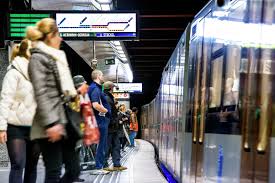Brussels' new coalition government will steer the region towards carbon-neutrality, boost road safety and push for greener mobility by developing the transport network and making it free for a larger part of the population, according to the governing agreement presented Wednesday.
Finalised in the early hours of Wednesday, the agreement will guide the six coalition parties as they attempt to tackle a series of environmental and social issues in the Brussels-Capital Region.
Clean air, free transport, improved mobility
The coalition agreed to make make the region carbon-neutral by 2050, a measure that was welcomed by environmental group Greenpeace as a "step forward," in the fight for climate, according to La Libre.
From 2020, a major shift in mobility policy will make the network of public transport operator STIB free for all users under the age of 25, in addition to senior citizens who already access it at no cost.
A contentious plan to improve road safety and boost air quality will see the speed limit in most regional roads slashed to 30 kilometres per hour.
The creation of more cycling infrastructure, the expansion of tram line 9, the enlargement of the bus network by 30% and the creation of new public transport lines all featured in the agreement as part of plans to reduce cars on the roads.
While the new mobility goals were generally welcomed by both environmental and road safety association, some groups say that the established 2030 deadline for a ban on all diesel cars in the region is "unambitious" in comparison to measures already undertaken by other European capitals, like Paris.
Housing and jobs
Regional leaders said the fight against the housing crisis would be one of the main priorities they will seek to address.
A plan to help 15,000 Brussels families get access to social housing will be put in place through the construction of new housing units, and the renovation of existing ones which will be made available at reduced costs.
While lead negotiator and incumbent minister-president of the region, Rudi Vervoort, said that the measures would provide a "concrete solution" to those in need of social housing, the previous government, also spearheaded by Vervoort, has only built around 100 housing units per year, according to Bruzz.
In addition, a plan to drop the registration fees for people buying their first home was also included in the agreement.
Youth unemployment will be tackled through the extension of the Youth Guarantee, which seeks to ensure that all those registered with employment agency Actiris will be contacted for a job, training or education within six months.
Multilingualism, connectivity
Bilingual and multilingual education in regional schools will be overseen by a new minister of multilingualism, who will also seek to promote the use of languages in other areas, such as culture and the arts, the leader of the liberal Open Vld said, according to VRT.
While pushed for by the Dutch-speaking liberal party, the long-expected roll-out of a high-speed 5G network in the region will be contingent on an assessment of the "environmental, health and privacy" impacts, according to the outlet.
Other measures leaders listed out in the agreement include a boost to make the remuneration of municipal councillors and aldermen more attractive by slashing their numbers progressively.
The leaders also intend to put forward a candidacy for Brussels to become European capital of culture in 2030.
Detractors of the agreement criticised the fact that it did not include a measure to merge the police zones nor the 19 municipalities of the region, with the nationalist N-VA party calling out the agreement as a sign of "institutionalised slowness" and lack of ambition to undertake real structural reforms.
The nationalists' criticism was echoed by the Dutch-speaking Christian-democratic CD&V party who said that the agreement was only a rebrand of measures already announced by the previous government, and that a full ban on diesel vehicles had been on the table since 2018.
Gabriela Galindo
The Brussels Times

